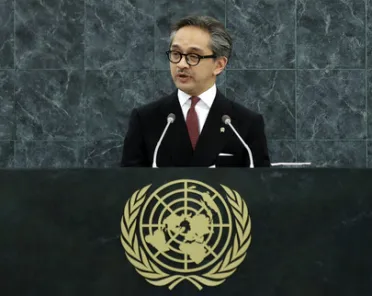Statement
Statement summary
MARTY M. NATALEGAWA, Minister for Foreign Affairs of Indonesia, said his country had an enduring belief in the efficacy and effectiveness of diplomacy, in maintaining peace and security, in advancing social progress and economic prosperity, and in promoting democracy, human rights and tolerance. The conflict in Syria had long demanded a political and diplomatic solution, because despite the undoubted complexity of the situation, three key needs remained compelling. The international community must halt the violence, facilitate humanitarian relief, and begin an inclusive political process. The recent breakthrough on chemical weapons in Syria was evidence that diplomacy worked, and further diplomatic momentum was needed. The Security Council must make a forceful case for a peaceful solution, and get the parties to the negotiating table by convening the Geneva II Conference. Similarly on the issue of Palestine, the full weight of diplomatic pressure must be brought to bear and General Assembly and Security Council resolutions must be implemented, he said. He welcomed the resumption of direct negotiations, which was a result of relentless diplomatic efforts. The same diplomatic pursuit must be applied to the common interest of all: the eradication of poverty, the promotion of sustainable development and inclusive finance, and overcoming the challenge of climate change. The development agenda must work for all countries — large or small, developed or developing — and each must share responsibility. The pursuit of a diplomatic path becomes fraught with challenges in a complex and fast changing world where the issues of governance, human rights violations, extremism and intolerance within countries can quickly obtain inter-State dimensions, he said. As countries embarked on a process of democratization and promoted the protection of human rights, the United Nations must contribute to a conducive atmosphere for their peaceful transformation. For its part, he noted that Indonesia was steadily developing a regional architecture conducive for the peaceful promotion of human rights and democracy called the “South-East Asian Nations Political-Security Community”. The primacy of diplomacy and of the peaceful settlement of disputes over war and conflict was never more evident than in the quiet and fundamental transformations that had taken place in Southeast Asia, he said. Indonesia believed the dividends of peace and stability were self-evident, and these were economic and social progress. The continued stability and security of the region was therefore key to secure prosperity. Indonesia was working with its partners to promote common security, prosperity and stability for all in the region.
Full statement
Read the full statement, in PDF format.
Photo

Previous sessions
Access the statements from previous sessions.
